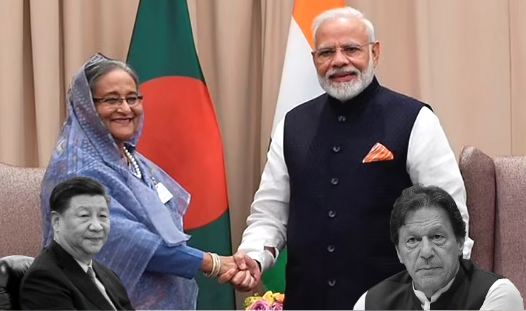India’s eastern neighbour, Bangladesh in clear words has sent a message to both China and Pakistan that despite their best efforts to turn Dhaka against New Delhi, the former stands stronger with the current administration in New Delhi, more so than ever. Speaking at a virtual seminar hosted by London-based International Institute for Strategic Studies, Bangladesh’s Gowher Rizvi, international affairs advisor to Prime Minister Sheikh Hasina said that Dhaka was more interested in joining the “Indo-Pacific relationship”, despite being part of Beijing’s ambitious neo-colonial Belt and Road Initiative (BRI).
“India is our most important partner and you cannot conceive of anything different. It would be suicidal to think differently,” said Gowher.
Speaking about China’s BRI and the Indo-Pacific, Gowher added, “We are part of China’s BRI but we are very willing to be a part of the Indo-Pacific relationship… we are not going to choose [between India and China],”
Gowher also pointed out that China had a role to play in Bangladesh’s growth story but it didn’t come at the expense of New Delhi. “China has a role in Bangladesh. They are an important part of our many development projects. But this is not in any way at the expense of our relationship with India.”
Prime Minister Narendra Modi will embark on a bilateral trip to Bangladesh later this month, his first abroad since the COVID-19 pandemic and thus the statements by Gowher comes at an opportune time to strengthen the relationship between the two countries.
India and Bangladesh have traditionally maintained close ties. However, the only thaw in the relations has been the inability to finalise a River Teesta water-sharing treaty. Speaking about the issue, Gowher said, “Unfortunately, Teesta [issue] continues to distract us from many other issues,” said Rizvi, pointing out that Teesta is one of 54 trans-boundary rivers shared between India and Bangladesh.
While China pumps in billions of dollars every year to keep the water in Teesta during the drought month, so as to keep pressure on New Delhi – Dhaka understands that it is the current regime of Mamata Banerjee that has helped lengthen the logjam. Reported by TFI, Mamata Banerjee has time and again expressed her reluctance towards the Teesta water treaty in the West Bengal legislative assembly.
Read more: Mamata Banerjee’s staunch opposition to Bangladesh is making India lose its valuable ally to China
But with the West Bengal Assembly elections fast approaching and there being a strong Modi wave in the state, one can be hopeful that the coming of a BJP government might help clear the logjam.
However, it is Pakistan and China that have been sent a strong signal that Dhaka will not be joining their anti-India nexus, albeit will be keeping its allegiances towards New Delhi. Lately, the politburo in Beijing has been trying to corner India by manipulating its neighbours. It started with Sri Lanka where CCP somehow captured the Hambantota port and later stretched its ill-intentions towards the Himalaya’s where Nepal and its communist regime was tricked into believing that New Delhi was its rival.
With the back against the wall, New Delhi didn’t flounder but slowly and surely brought these countries, back into its fold, and thus it is only the terrorist state of Pakistan that is openly alleging its support to Xi Jinping and his CCP.
